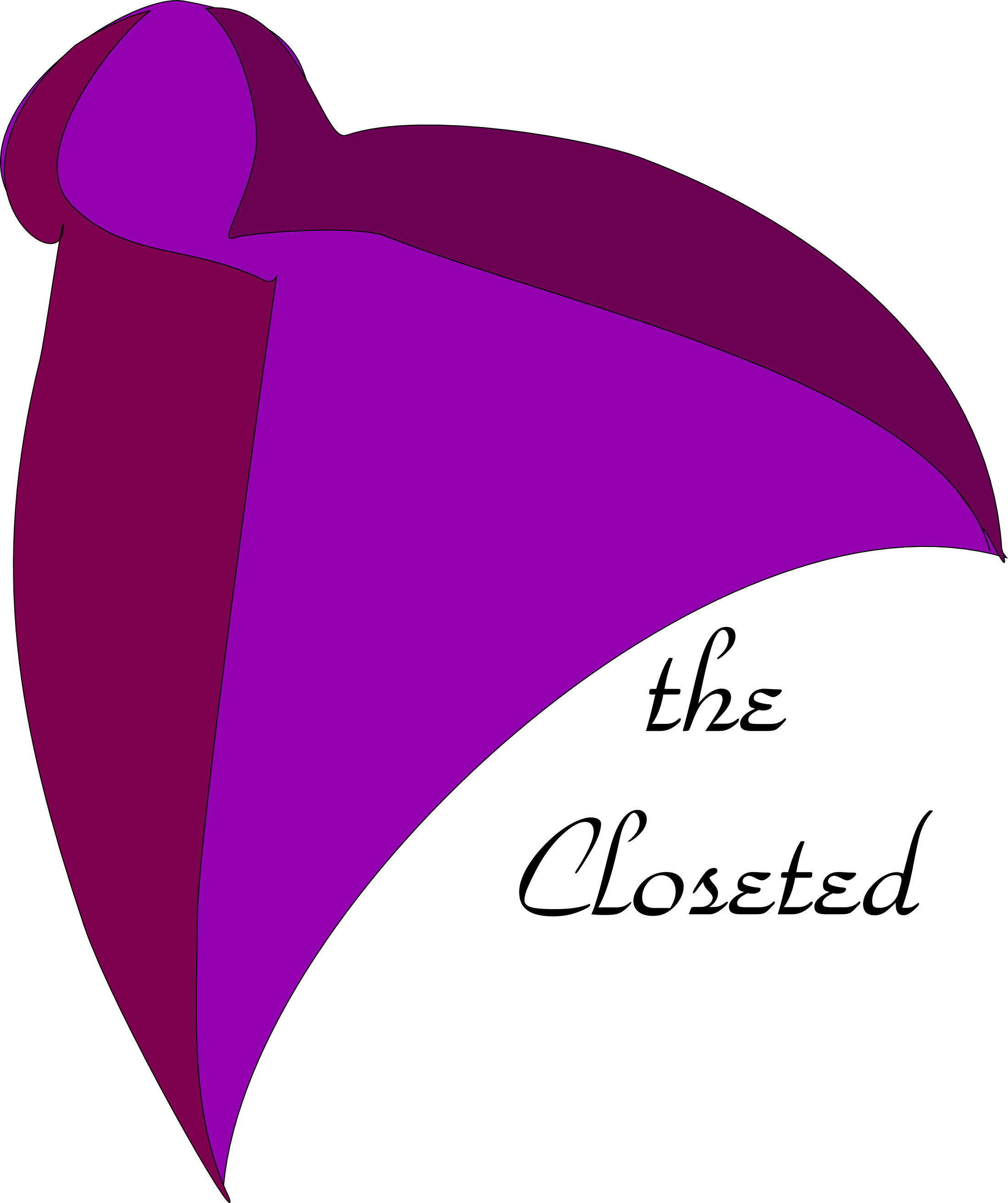 THE CLOSETED
THE CLOSETED

 THE CLOSETED
THE CLOSETED

WHAT IS BEING CLOSETED? I. EXAMPLES.
*** Any person who doesn't tell some or all of the world around them about significant aspects of themselves.
*** Call the aspects in question X.
1) Well-known examples of X are Gay, Trans and LGBT+.
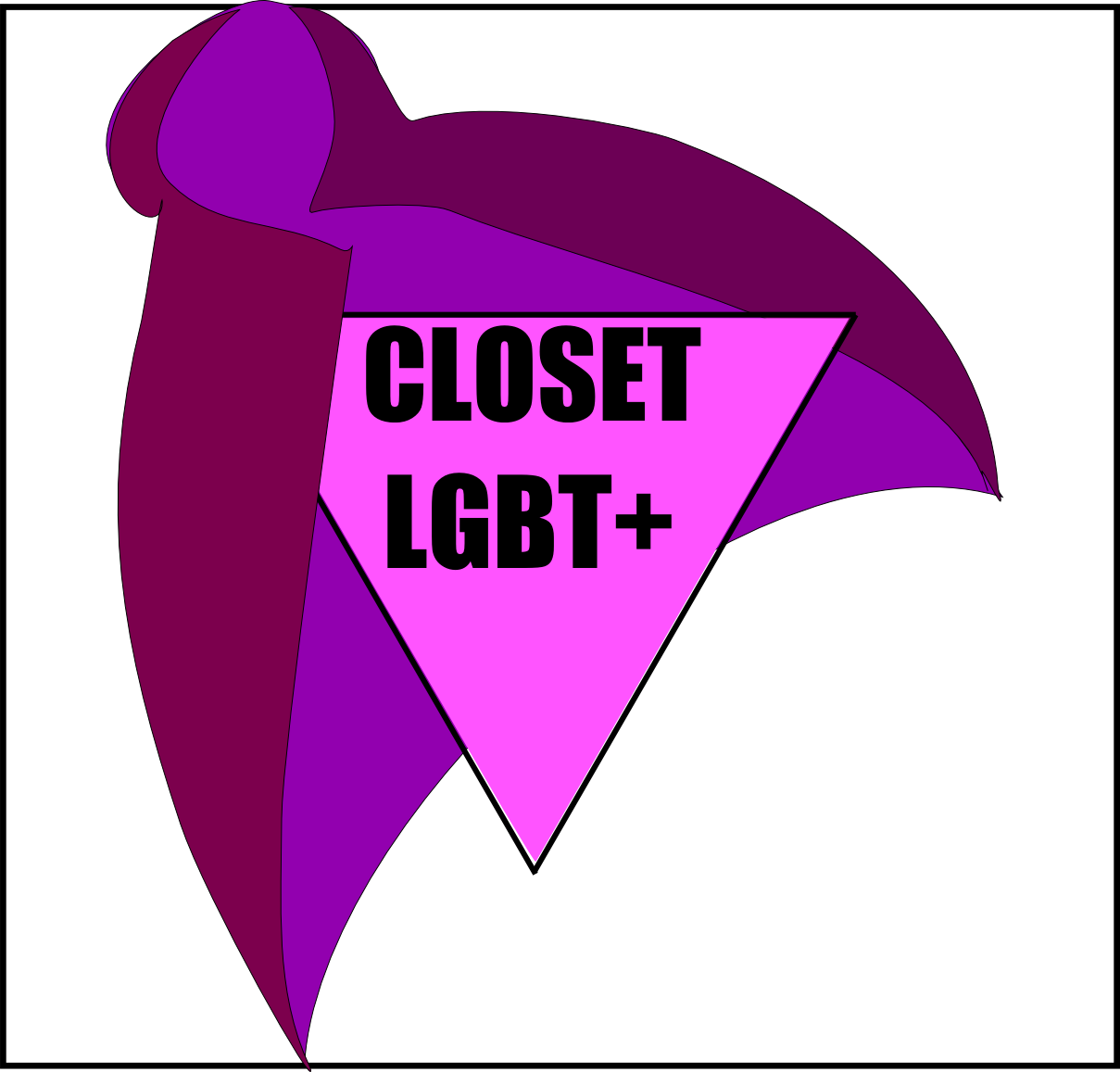
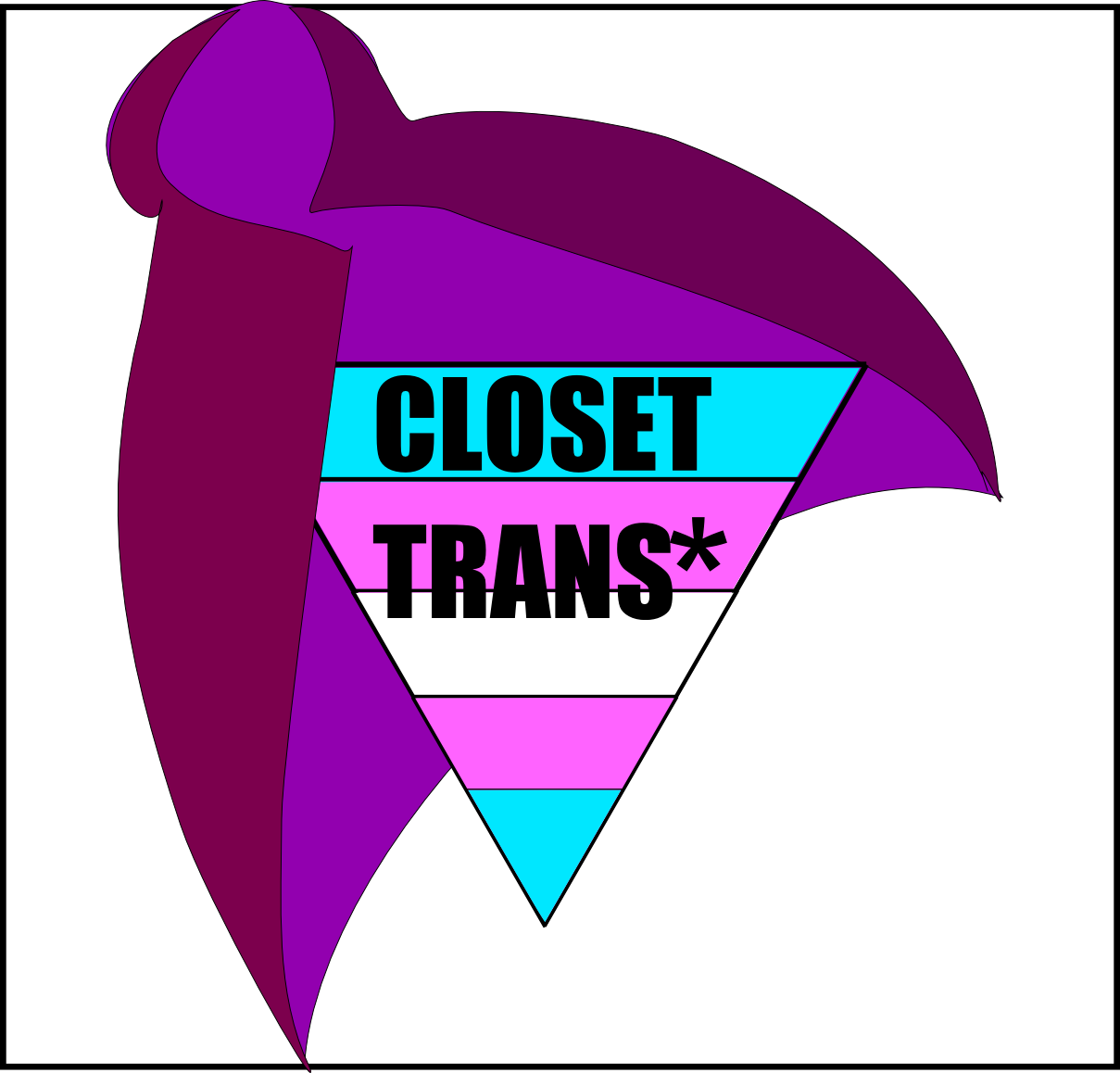
3) and Non-Binary...
4) and Pan, Genderfluid, Kinkster, Disabled, Mental Health.
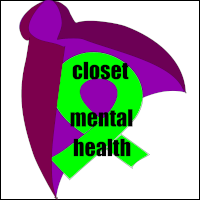
5) And also Survivor, Currently Bullied, Trapped in Domestic Violence. Oh.
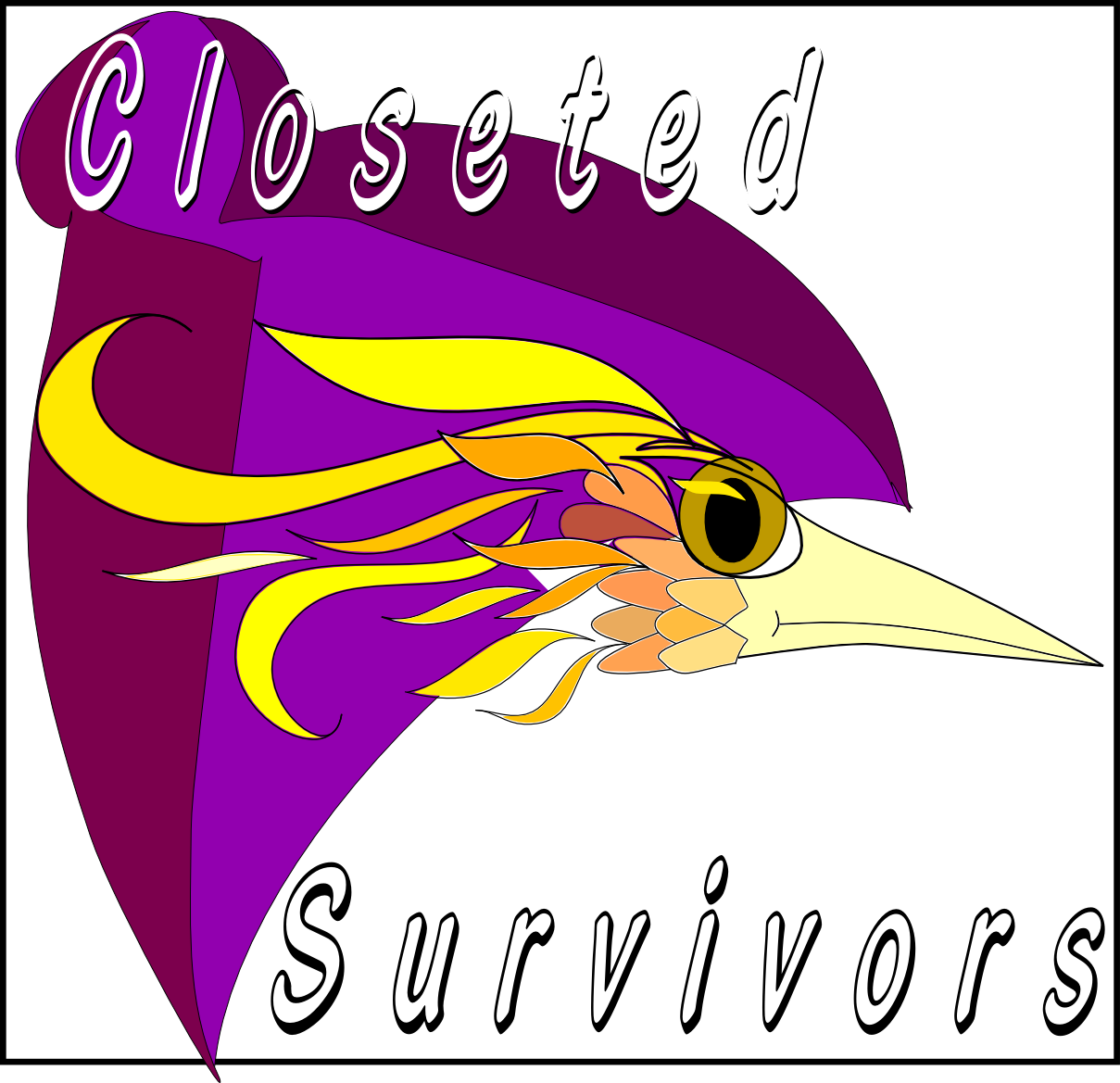
*** Closet-X occurs in a massive proportion of cases to it being safe to be Out about being X.
* Because of this most of those currently affected by things like 5) are Closeted about it.
* In fact, between approximately half and a large majority of 4)'s are Closeted as well (at least among those of between uni age and ten years past leaving uni).
* In many parts of the world, there isn't enough safety or understanding for most of the Aces and Polys of 3) to be Out either.
In Cambridge itself, there largely is enough safety and recognition for thes now, as of 2014 or 2015.
* Current 'official campaigns' have since turned to Non-Binary matters 3); that is where the 'edge of recognized and safe' now lies in Cambridge.
It is less clear the extent to which Genderfluid people's issues are for now included in such campaigning, not least because many Closeted people don't consider it safe to provide feedback to reps, activists or members of the student press.
*** More generally, even after X is not only not persecuted but also legally protected, some people aren't OK about being Out.
* For instance, many references to 'the Trans* Community' actually refer to that Out Trans Community that interact as a conventional group and either are, or are OK around, activists.
* But the city currently contains at least five other Trans* communities who don't feel themselves or their views to be included in, reflected by - or even approachably explainable to - 'the Trans Community'.
* Various pilot surveys indicate that, among those 'of university age', between 50 percent and 75 percent of Trans* people aren't Out, either ever at uni or they only come out after years (e.g. as grads, or in 4th year, or in 3rd year after degrading).
* This data is likely consistent with the recent very large UK Trans Survey, in which the proportion of the population telling the survey they are Trans went up by a factor of around 3 on previous estimates.
* While for now it is only a hypothesis, one possible explanation of the threefold increase is that for the first time Closet-Trans people found the format of the survey to be safe enough and inclusive enough of Closeted people for them to take part in it.
* The 'more obvious' explanation that there are now more Out Trans people has accrued a certain amount of evidence against it, in so far as local Out Trans groups, 'official' or otherwise, have not anywhere near tripled in size. And other demographic observations roughly concur with this.
* So, while there's likely been some increase in the proportion of Out Trans people at University in the UK, most of a threefold increase in Trans* numbers is likely not due to that but rather due to Closet Trans people now being willing to give feedback, at least if that feedback is in a format which has enough security, de facto anonymity etc.
* One side-product of this study is the high likelihood that some other Closeted groups would also respond in significant numbers to surveys.
*** Closet Mental Health people are believed to be at least one order of magnitude more numerous than Closet-Trans people, and, as such, sufficiently inclusive, approachable, secure and de facto anonymous surveys are likely to get many hundreds of answers about this.
* This would very likely confirm that the Closeted population is very large, and that much of the Closeted population feels between mostly and totally left out by current welfare provision.
* Closeted people were quite simply not consulted in such as the determination of what training counsellors, reps and tutors should receive.
* Closeted people often wish for help in remaining closeted more effectively, but counsellors aren't trained in secrecy or de facto anonymity.
* Nor are welfare services trained in recommending personal security helplines as well as listener ones.
* Hell, personal security helplines don't really even exist yet anywhere, certainly not as free services run by good-cause volunteers...
* And Closeted won't use any service that 'makes records' or has certain 'non-confidentiality clauses' masquerading as 'confidentiality clauses'.
* Until counsellors, listeners, reps, tutors are trained in what Closeted people say we need, they will likely remain unaware of why they get between few and no Closeted customers using their welfare services.
* Even feedback procedures for many of these things fail to be secure and de facto anonymous enough for Closeted people to dare raise any concerns about how we, as Closeted people, are being left out in practise by what the totality of such 'official services' provide.
WHAT IS BEING CLOSETED? II. SOME MORE KEY PROPERTIES.
*1* Let us sum up the end of the previous section by saying that most Closeted people only confide in services that are both friendly and demonstrate enough awareness of personal security and de facto anonymity.
* Most Closeted people's decision to remain Closeted (and occasionally of when to Come Out) is security-valued, and can only be understood and assisted by those who are trained in security, secrecy and de facto anonymity as well as in 'currently acknowledged more obvious welfare areas'.
*2* Being Out is a choice that each person makes for themself.
*3* Closeting is moreover multi-layered.
* For instance, some people who are Out as Gay are in fact additionally Closeted about being Bi or Trans...
*4* The progression from 1) to 5) - an approximate security-vlaued and public-awareness-and-acceptance scale of which X people are more to very much less likely to be Out about - is an over-simplification as regards intersectionality, which starts with being X and Y.
* If Out-X and Out-Y separately face prejudice and adversity, some people who are X and Y can't cope with the 'obvious sum' of both adversities.
* Moreover, some can't cope with the sum of being Out-X and Closet-Y, for being Closeted is a separate source of adversity. In some cases, then, one is Closeted about enough things that one can't cope with being Out about any of them.
* Intersectionality is furthermore usually about how being X and Y at once faces larger adversities and prejudices that the 'obvious sum'.
* For instance, other Out-X's may demean, bully or ostracize Out-Y's. In some cases, just-X's and just-Y's have a large tendancy to dislike the other. Leaving anyone who's Out-X-and-Y with nothing. No community. No support group. No understanding from 'welfare support' that their provision of an X-group and a Y-group won't do for any X-and-Y people due to common dislike between just-X's and just-Y's.
* Some people in this situation choose to be Out-X and Closet-Y. However, they can still then find that the other Out-X's often speak unpleasantly about Y's, and may be familiar enough with their enemies the Out-Y's to spot Closet-Y's among the Out-X's. So an X-and-Y who Comes Out about X may suddenly find they need to be better at keeping secrets and Passing as not-a-Y, and no 'official welfare' in existence provides any way of helping with that.
* One might also think: why don't the X-and-Y's form their own support group? But X and Y are usually quite rare, and are roughly independently distributed. Meaning that the expectation value of Out-X-and-Y people can sometimes be approximately one. Especially when other factors enter the back of the envelope calculation, such as one or both of X and Y being mostly closeted, or that the person is X-Y-and-Z and no pair of these get on well enough for an X-and-Y-and-Z person to feel safe in an X or Y or Z group.
* Resolving this of course paves the way to General-Purpose Safer Spaces, where almost all attendees are very different from each other. United through tolerance of all other tolerant people (rather than through all sharing in being X) and functioning through each person having whatever worldview they please but not attempting to push that worldview on anyone else. Then many of the very rare X's, and of the intersections between 2 or more characteristics, can peacefully coexist in a space of this nature.
* Base the General-Purpose Safer Space on 'a person is upset if they say they are and without having to say why', and recruit for-fun participants for Closeted people to claim to be among, and that space caters for all those who are totally or partially closeted as well!
* The previous two points describe how our Safer Spaces work, and have been working in this manner for many years now :)
III. Closeted people require entirely different support mechanisms from Out people
[An older account, with some partial overlap with I above.]
* For instance, Closeted people may wish for or require support in how to Pass as not being X.
A) In some cases, this requires advice in how to tell better lies.
B) In some cases, this requires a person helping us to be honest about whether we don't Pass, and why.
Conventional welfare services aren't trained to do A) or B) and quite often refuse to do so, and have nowhere else to recommend the person try to find this support. There appears to be no effective way of giving feedback to current conventional welfare services that a large proportion of those most in need require services of kinds that 'current thinking' does not associate with welfare.
* Most Closeted people are not Out to welfare/pastoral/disciplinary staff.
This means that only having support for people who are Out about what their issues are substantially isolates Closeted people.
Who usually don't even have the means to dare to say that we are being left out or receiving substantial prejudice against X people and/or Closeted people in general.
Most Closeted people will only come to have any confidence at all in using any part of 'the official system' when people in general gain the right to be left alone without having to say why.
This is a long way away and cannot be attained by tacking on 'and closeted people' after current model non-discriminatory legislature.
As such, many Closeted people lead lives that refrain from contact with any part of the 'official system'.
In some small corners of the world, what Closeted people need has been carefully listened to and is provided there. These small corners are very proud of having nothing whatsoever to do with what 'official bodies' consider to be defaults. For in fact many such defaults discriminate against Closeted people, quite often leaving us with nothing we feel safe with using on 'official turf'.
IV. Outnormativity and closetphobia
[Our upcoming Glossary of Safer Space Peoples and Adversities we face has more on these, and a myriad of other such.]
* One of the forms currently taken by closetphobia is some individuals or groups claiming that 'being Out is better than being Closeted'.
* Some such individuals or groups don't accept that Being Out is each person's personal choice, that this is often security-valued.
E.g. a Closet-Gay person who's an international student who has to go home to a country that criminalizes homosexuality, in a global social media age, may not agree that 'it's safe to be Out here' applies to them. Indeed the very concept of 'it's safe to be Out here' is, tacitly, based on the extent to which one can isolate what is known 'here' form what 'can be found by the person's country's repressive government' (or what 'can be found by another person's family, who would then disown them, leaving them Homeless out of termtime...)
Now reflect on the idea of a person with no training in information security telling either of the above people that 'it's OK to be Out here'. Finally reflect on the idea of that 'official individual' saying this in an assertive or pushy manner. The conclusion is that we'd be better off if reps had security training, and that reps being pushy in an unchecked manner can have very unfortunate consequences.
* One of the forms currently taken by outnormativity is the refusal to accept that current welfare, listening and support services were set up without consultation of what Closeted people's needs are.
* One of the forms currently taken by outnormativity is a counsellor's assumption that 'they know better' than their customer, which is rooted on the assumption that their customer is Out, and about everything. This particularly affects the non-confidentiality clause that is based on the presumption that the counsellor 'knows better than' their customer if the customer is in danger. Firstly, counsellors aren't formally trained in what being in danger means. Secondly, the reverse could easily be true for a Closeted person: that reasons they are not Out to the counsellor about mean that telling on the customer places them in much more, rather than much less, danger.
* An important resolution of this point is that people badly in need of a counsellor, who are badly in need of not being told on by that counsellor if the 'part of the truth' they are willing to tell the counsellor looks like it might place them in danger, can find counsellors in certain other countries that don't have this kind of non-confidentiality clause. If you email us, we can tell you of countries fairly nearby whose counsellors don't do this. All you need then is a few hundred pounds to spend on a week off in such a country, and university holidays are so very long.
* One of the forms currently taken by closetphobia is the dismissal out of hand, blanking, even abuse and threat-making that has been thrust in the faces of some of those raising issues about Closeted people largely not finding current welfare, listening and support services approachable.
* Because very large proportions of people who are Survivors, Currently Bullied or Trapped in Domestic Violence are Closeted, this closetphobia often de facto amounts to survivor-phobia, avoidant-survivor-erasure, non-normative-survivor-erasure, survivor-of-bullying-erasure, domestic-violence-erasure and currently-trapped-in-bullying-erasure.
* There are approximately as many oppressions and prejudices encountered by Closet-Trans people as there are by Out-Trans people, just different in each case. It is closetphobic to 'define' transphobia to only consist of the latter. True transphobia covers both.
* True X-phobia covers both oppressions and prejudices faced by Out-X and oppressions and prejudices faced by Closet-X.
V. A little 'for fun' parable
In the manner of our people, we will tell a story and set up a little 'for fun' activity as part of what we do here.
Only activities containing for-fun participants are safe for most Closeted people to use, since then Closeted people can pretend to be amongst those there 'for the fun activities' rather than because we need the safer space.
Similarly, a group calling themselves X-support group or X-soc is very largely only for Out-X people, since Closet-X people are too concerned with being assumed to be X by association to attend.
And so Closeted accommodating groups have had very colourful names over the years which make no reference to those accommodated and supported. Names such as 'Sheila and her Dog', or 'All Souls Assassins Service' are or have been such...
As far as we know, closeted awareness started in such places in the 1990's. At that time, some Closeted people and Allies interpreted the cape of Terry Pratchett's Assassins' Guild as a Closeted Symbol.
These started, for instance, to draw this with the LGBT Pink Triangle on the inside, instead of the usual Assassins' Guild Cloak and Dagger, culminating in this Safer Space symbol:
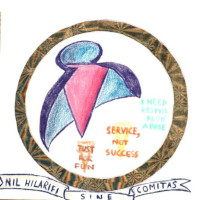
The three phrases inside the General Purpose Safer Space Golden Circle here signify that a place approachable by Closeted people has three types of attendees: those needing the safer space, helpful people and people there 'just for the fun' in the purported activities of the soc. These three bunches of people are by no means mutually exclusive, nor is it any of anyone's business who is present for reasons other than 'the fun'. 'The fun' in such paces never extends to 'fun' at others' expense, nor are such places open to seizure by 'for fun' participants who would eschew the (possibly secret) mission statement that the activity exists as a means of being supportive toward Closeted people...
Our little story for now concluded, we will next gradually draw other Closeted crests/flags based on this principle here.
Scroll upward for what flags we've already made.
Coming up: Closet-Ace, Closet-Poly, Closet-Pan, Closet-Non-Binary, Closet Genderfluid, Closet Currently-Bullied.
Closet Trans previously declared at this point: a majority of university age Trans people are Closeted, and are approximately as vulnerable as Out Trans people but for a different set of reasons. Out Trans are often bullied by strangers and transphobic acquaintances. Closet Trans people may be very unhappy about the appearance, name and role we feel we have to present to the world, and we are sometimes bullied by people who go around making gender-based stereotypes.
Closet Survivors previously declared at this point: Since a large majority of Survivors are between partly and totally closeted in relation to being a Survivor, not providing services useable and approachable by Closeted people is actually leaving a large majority of Survivors without resources that we feel to be safe to use. For now, have this link.
Closet Disabled and Closet Mental Health issues are now preparing a declaration to go here. Watch this space.
VI. Update: we now have these badges
Each badge will link to specific material, though for now the update material on Closet-Trans and Closet-Mental-Health forms part of this page's discussion, and almost all Avoidant or Non-normative Survivors are Closeted. Thus, much of what is on our Survivor pages here and Thus, much of what is on our Survivor pages here applies to Closetedness as well.
This includes the argument that Closet issues and Survivor issues have to be tackled jointly; any attempt to treat one of these matters without the other is believed to make only very moderate progress as compared to treating the two together.
VII. Other upcoming Closeted resources.
We will also provide a compendium of why Closeted people can choose to remain closeted (for now is going in the upcoming Glossary of Safer Space Peoples and Adversities we face). And of what kinds of support actually work for us. We then hope that a small proportion of others' resources will be used in ways that we can make good indirect use of. This is well beyond the scope of current welfare arrangements, which have hitherto had essentially no input from Closeted people as regards what our actual needs are.
Closeted people often need Allies far more than Out people do. In some cases, Closeted people only interact by Allies. See here for more about being an Ally to a Closeted person and/or Survivor, based on suggestions from the actual scope of what Closeted people and Survivors actually think, want and need. (Previous groups suggesting such things would not appear to have been approachable/anonymous enough to actually get feedback from, say, Avoidant Survivors, or elsewise to not have heeded any of that feedback.) Were there 'official' Closeted rep positions, virtually no Closeted people would dare to stand for them. Hence the dictum that 'to be an X-rep one has to oneself be X' is in fact, when it comes to Closeted people, a major prejudice (outnormativity) depriving us of reps in Official places, reps who would almost certainly to start off with be Allies to Closet-X rather than Closet-X's themselves... So that's another way that the current world really doesn't work as far as accommodating Closeted peoples' wishes is concerned... :P
Thankyou for reading. Because most of us don't feel safe around the current world's welfare officials, reps, activists, journalists and bureaucrats, we require to be left totally alone by anybody who meets any of these descriptions.